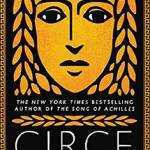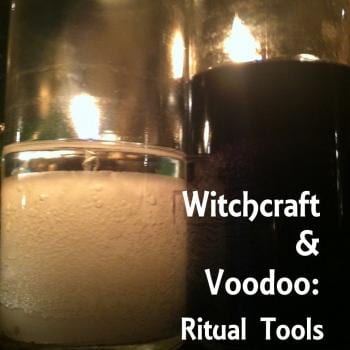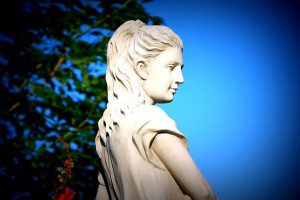
In modern Wicca, we don’t have a lot of commandments, and creedal statements that we are all pledged to believe. But that doesn’t mean that we don’t have theology and ethics – just that we express them in less obvious ways. In fact, there are many unspoken beliefs that we think of as being essentially “Wiccan.” Where do they come from?
The answer should be self-evident but often isn’t. What is the one piece of liturgy that most Wiccans share? The answer is the Charge of the Goddess.
These days, most of us treat this poem simply as a lovely way to invoke the Goddess, and it does work well that way. But consider the original meaning of the word “charge” – a command, an exhortation – and it become apparent that this is actually a series of theological and ethical principles in poetic form.
There are two most popular versions of this document, attributed to Gardnerian elder Doreen Valiente and Reclaiming founder Starhawk. In this article, I’m going to examine both versions, with the aim of explicating and analyzing what each tells us about a common Wiccan code of ethics.
Valiente:
Listen to the words of the Great Mother;
she who of old was also called among men
Artemis, Astarte, Athene, Dione, Melusine,
Aphrodite, Cerridwen, Cybele, Arianrhod,
Isis, Dana, Bride and by many other names:
Starhawk:
Listen to the words of the Great Mother, Who of old was called Artemis, Astarte, Dione, Melusine, Aphrodite, Cerridwen, Diana, Arionrhod, Brigid, and by many other names:
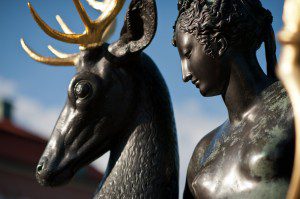
The Goddess says, first and foremost, “Listen!” This isn’t merely a poetic way of beginning the Charge, but rather, a command to attend carefully to what follows.
Many of the same Goddesses are also mentioned in both Charges. The goddesses common to both versions are Artemis, Astarte, Dione, Melusine, Aphrodite, Cerridwen, Arianrhod (different spellings,) and Bride/Brighid. (The additions to this list probably reflects the tastes of the two authors.) But notice the variations! There are Maiden Goddesses, Mother Goddesses, and Crone Goddesses. There are Goddesses of Death and Goddesses of Life. There are Goddesses from multiple cultures. But in both cases, the Goddess is named “Great Mother . . . and by many other names.” This reflects the common Wiccan belief in the One Goddess being present in all goddesses. But it also acknowledges that these individual Goddesses are separate beings, otherwise why mention them separately at all?
By listing Them together, the authors are also claiming that all these Goddesses are equals and are equally worthy of our respect. I think it is important, then, that if we personally follow a goddess who is not mentioned in this passage of the Charge, we should make sure to include Her when we recite it.
Valiente:
Whenever ye have need of anything,
once in the month, and better it be when the moon is full,
then shall ye assemble in some secret place
and adore the spirit of me,
who am Queen of all Witcheries.
Starhawk:
Whenever you have need of anything, once a month, and better it be when the moon is full, you shall assemble in some secret place and adore the spirit of Me Who is Queen of all the Wise.
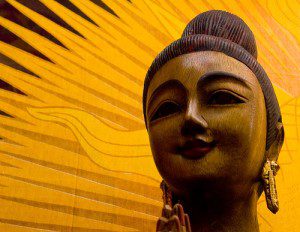
Although many, if not most of us practice as solitaries, our Goddess still wants us to gather together in groups for Her worship, with a specific guideline: “Better it be when the moon is full.” Why?
Most Witches know that magick brought to fruition on the Full Moon has the power of the waxing moon behind it. Wiccan writers in the past have postulated that maybe it’s just that since we were supposed to meet in secret, we would most likely be meeting at night, and with a full moon, you can see where you are going when you wander into the woods. Maybe it’s just because the Full Moon has always captured our imagination.
The Goddess also says, “You should gather in a secret place.” Once a month, She wants us to gather away from the public eye. This emphasizes that much of a Witch’s work is mystical in nature and should be shared only to those who are willing to understand (which is why you traditionally had to be initiated first, though of course this is no longer the case.) This Inner Work (connecting with the Goddess) is necessary before one can do the Outer Work.
The Lady also says, “You shall adore Me, who is the Queen!” That means that we need to worship and respect Her as a Power greater than ourselves. Note that She says “adore,” not “fear” – we don’t need to fear the Goddess. She wants us to love Her. She also loves us, because real love is a two-way street. This is an important distinction.
Valiente:
There shall ye assemble,
ye who are fain to learn all sorcery,
yet have not won its deepest secrets;
to these will I teach things that are yet unknown.
Starhawk: no equivalent section.
Which Charge do you follow? This is the first really significant difference between these two Charges: in Valiente’s version, you are commanded to learn magick. If you choose to follow Starhawk’s Charge, there is no requirement to learn (or do) magick. There is also a strong indication that we will never “win its deepest secrets,” and thus we are exhorted to always keep learning.
Valiente:
And ye shall be free from slavery;
and as a sign that ye be really free,
ye shall be naked in your rites;
and ye shall dance, sing, feast,
make music and love,
all in my praise.
For mine is the ecstasy of the spirit,
and mine also is joy on earth;
for my law is love unto all beings.
Starhawk:
You shall be free from slavery, and as a sign that you be free you shall be naked in your rites.
Sing, feast, dance, make music and love, all in My Presence, for Mine is the ecstasy of the spirit and Mine also is joy on earth.
For My law is love is unto all beings.
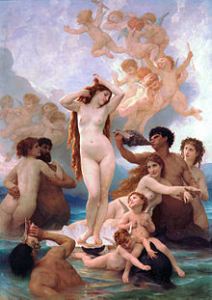
These are some of my favourite verses! The Goddess says, “You shall be free from slavery.” In this section, Wicca is explicitly named as a counter-cultural movement. In order for us to be free, we have to think for ourselves. We should also abhor slavery and try to fight it. (Note that I do not consider BDSM relationships between consenting adults to be “slavery” in this context, and I will elaborate further later in the essay.)
She also commands that we shall “be naked in our rites.” At one time, all Wiccans took this to mean skyclad (clothes-free) practice, but many, if not most, of us have since adopted ritual robes. The question is, what did She mean by “naked?” The obvious answer is, of course, without clothing, but it can also mean unadorned and willing to be vulnerable.
Next, we are exhorted to “sing, feast, dance, make music and love.” Wicca is, at its root, a joyous, earthy, embodied religion. So says the Goddess! She wants us to make a joyous noise, to sample freely of the fruits of life, to offer up celebratory and joyful movement, to create art, and to love freely and without guilt.
Finally in this passage, the Lady announces very clearly that “Her law is love unto all beings.” That includes the jerk who cut you off in traffic, the miserable boss who is riding you for no good reason, the irritating cousin you would rather not admit that you know, that dog next door that won’t shut up at 3 a.m., mosquitoes and wasps and spiders and snakes and beetles too. All beings, no exceptions.
Valiente:
Keep pure your highest ideal;
strive ever towards it;
let naught stop you or turn you aside.
Starhawk writes no equivalent passage.
I think this passage is already very clear and it doesn’t require much paraphrasing. The Goddess wants us to hold to our highest ideal (note that She said, “your highest ideal,” not “My highest ideal,” which means that this is a matter of personal choice for us, and we get to decide what that ideal is.) She wants us to always work to achieve it, and not to allow anyone to dissuade us from it or distract us from it. Those who follow Aleister Crowley’s work will recognize this as a clear command to focus on, and work consistently to achieve, our True Wills!
Valiente:
For mine is the secret door
which opens upon the Land of Youth,
and mine is the cup of the wine of life,
and the Cauldron of Cerridwen,
which is the Holy Grail of immortality.
Starhawk:
Mine is the secret that opens the door of youth, and Mine is the cup of wine of life that is the cauldron of Cerridwen, that is the holy grail of immortality.
!["Proserpina" by Dante Gabriel Rossetti [Public domain], via Wikimedia Commons](https://wp-media.patheos.com/blogs/sites/482/2015/03/Proserpina_by_Dante_Gabriel_Rossetti-207x300.jpg)
There is a fine distinction here between the two Charges. Valiente refers to the “secret door which opens upon the Land of Youth,” and Starhawk refers to the “secret that opens the door of youth.” This represents a difference in Gardnerian Wiccan and Reclaiming Wiccan theologies. For the Gardnerians (Valiente’s tradition,) the Land of Youth is the Summerlands, an occult mystery. For the Reclaiming Witches, the “fountain of youth” is a mental state that can be reached by anyone of any age through the Secrets of the Goddess. For Doreen Valiente, the Goddess asks us to seek the Summerlands through occult practice. For Starhawk, the Goddess wants us to seek inner youth.
Either interpretation fits the rest of the passage, in which the Lady claims the mysteries of Life, Death, and Rebirth as Her own. “The cup of the wine of life” can be seen both as the joy of Life celebrated and as the Mother’s womb. The Cauldron of Cerridwen is the cauldron of transformation; the tomb that is also a womb. The Holy Grail has long been seen in occult circles as a symbol of the power of the Divine Feminine and of immortality. By claiming these mysteries, the Goddess tells us not to fear death, but to accept it as part of the process of life. She tells us to remember that all things come in cycles. She reminds us that no matter how difficult things are, this, too, shall pass.
Valiente:
I am the Gracious Goddess,
who gives the gift of joy unto the heart of man.
Upon earth, I give the knowledge of the
spirit eternal;
and beyond death, I give peace and freedom
and reunion with those who have gone before.
Starhawk:
I give the knowledge of the spirit eternal, and beyond death I give peace and freedom and reunion with those that have gone before.
The Lady is telling us, “If you’re in touch with My mysteries, then when you die, I will give you peace, and freedom, and you will be reunited with those you love.” What form this reunion will take is subject to debate.
Valiente:
Nor do I demand aught in sacrifice;
for behold,
I am the Mother of all living,
and my love is poured out upon the earth.
Starhawk:
Nor do I demand aught of sacrifice, for behold, I am the Mother of all things and My love is poured out upon the earth.
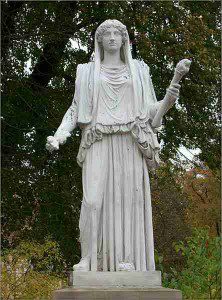
So, our Goddess does not ask for us to sacrifice anything! Her love is not a transaction: She does not require payment, but freely gives abundance. I believe it is only good manners to return the favour, and at rituals I offer Her the first portion of the wine and the feast; at every harvest, I offer Her the first portion of my carrots, grapes, pumpkins and so forth. I offer it freely in gratitude for all that She has given that I have received.
I believe this also means that She doesn’t want us to sacrifice our self-respect, our needs, our self-esteem, our code of honour, our personal space . . . nothing.
She goes on to remind us that She is the Mother of all living things and She loves all of them. Note, too, that She makes sure to clarify, by telling us that Her “love is poured out upon the earth,” that this includes plants and spirit-beings as well (and in Starhawk’s version, it also includes “unliving” things, like mountains, computers and dirt.) If Her “love is poured out upon the earth,” shouldn’t ours be as well?
Valiente:
Hear ye the words of the Star Goddess;
she in the dust of whose feet are the hosts of heaven,
and whose body encircles the Universe.
Starhawk:
Hear the words of the Star Goddess, the dust of Whose feet are the hosts of Heaven, whose body encircles the universe:
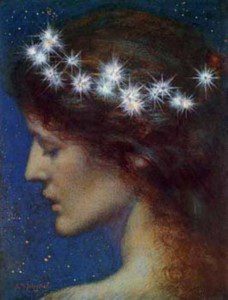
Who is the Star Goddess? Well, this is the Great Cosmic Goddess, of Whom all Goddesses are but a part. Since Her “body encircles the universe,” She encompasses all of us and we are contained within Her. She goes far beyond the “hosts of heaven” (the gods;) so this is the “Goddess of the gods,” the Great Creatrix.
Author’s Note: I wrote this piece a couple of years ago and have since amended my analysis. There are many possible interpretations of “the Goddess,” as I wrote about recently. And I’ll be writing more about possible interpretations of the Wiccan concept of the Star Goddess in the near future. But I did not remove this passage because it is what I originally wrote.
Valiente:
I who am the beauty of the green earth,
and the white Moon among the stars,
and the mystery of the waters,
and the desire of the heart of man,
call unto thy soul.
Arise, and come unto me.
Starhawk:
I Who am the beauty of the green earth and the white moon among the stars and the mysteries of the waters, I call upon your soul to arise and come unto me.
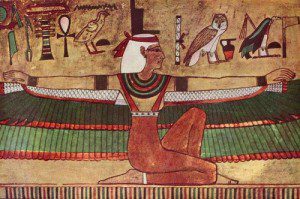
The Creatrix identifies Herself with the earth, the moon, and the mysterious waters. She is a part of all creation, not separate and standing above it. She tells us that She is “the beauty of the green earth.” If the earth is sacred, and our Goddess is there, we must, must care for it and treat it with reverence and respect! Through these mysteries, the Lady calls to our very souls, and She asks us to arise – not to kneel – and come to Her.
Valiente:
For I am the soul of nature, who gives life
to the universe.
From me all things proceed,
and unto me all things must return;
Starhawk:
For I am the soul of nature that gives life to the universe.
From Me all things proceed and unto Me they must return.
Our Goddess proclaims that She is the soul of nature, and this soul is what gives life to the universe. So We can infer by this that our cosmology has both spirit and body; as does She. She also says that everything comes from Her and returns to Her in the end. She is the great cosmic consciousness, and the womb and tomb. The cycle of life includes the cycle of death; the two are not separate. So She asks us in this to accept change and transformation, ebb and flow.
Valiente:
and before my face, beloved of Gods and of men,
let thine innermost divine self be enfolded
in the rapture of the infinite.
Starhawk again writes no equivalent.
Valiente’s Goddess tells us that in Her presence, we are loved by the Gods and by humanity. She reminds us that our innermost self is divine, and She asks us to “be enfolded in the rapture of the infinite.” In this simple phrase She reminds us to appreciate the earth, moon and sky, and ocean, but She also encourages us to seek the mystical state of enlightenment.
Valiente:
Let my worship be within the heart that rejoiceth;
for behold, all acts of love and pleasure are my rituals.
Starhawk:
Let My worship be in the heart that rejoices,
for behold, all acts of love and pleasure are My rituals.
The Goddess commands us to worship Her by celebrating love and pleasure. Thus, sexuality is sacred. When you take this proclamation together with the appreciation of nakedness earlier in the Charge, it makes for a very liberating sexuality. But take note: anything that cheapens the experience of love and pleasure insults the Goddess. (That’s a pretty good definition of sin.)
Valiente:
And therefore let there be beauty and strength,
power and compassion, honour and humility,
mirth and reverence within you.
Starhawk:
Let there be beauty and strength, power and
compassion, honor and humility, mirth and
reverence within you.
This is the most ethically explicit in the Charge. Note the balance emphasized here. The Goddess wants beauty and strength, power and compassion, honor and humility, mirth and reverence. When we Wiccans speak of finding balance, it is these qualities we are especially trying to embody.
Valiente:
And thou who thinkest to seek for me,
know thy seeking and yearning shall avail thee not
unless thou knowest the mystery;
that if that which thou seekest
thee findest not within thee,
thou wilt never find it without thee.
Starhawk:
And you who seek to know Me, know that the
seeking and yearning will avail you not,
unless you know the Mystery: for if that
which you seek, you find not within yourself,
you will never find it without.
To me, this is the most profound passage in the Charge: the Goddess tells us not to waste time looking to others for our validation, but to look within. The Goddess also reminds us that changing what is within changes what is without. Be the change you would see in the world. “As above, so below.”
Valiente:
For behold,
I have been with thee from the beginning;
and I am that which is attained
at the end of desire.
Starhawk:
For behold, I have been with you from the beginning, and I am That which is attained at the end of desire.
In conclusion, the Lady reminds us that She has always been with us, She will always be with us, and She is what we ultimately seek – and will find! For me, that’s a pretty comforting thought.
The Charge of the Goddess encapsulates theology, cosmology, and ethics in a lyrical poem of great beauty. If you wish to understand the Goddess, I have no better advice than this: study, contemplate, and drink deeply of Her words.
References:
Starhawk, “The Charge of the Goddess,” from The Spiral Dance, HarperSanFrancisco, 1975, 2010.
Valiente, Doreen, “The Charge of the Goddess,” from The Gardnerian Book of Shadows, 1957, 2007, available at www.sacred-texts.com.
This piece was published in Witches & Pagans Magazine Issue #29 (Winter 2014), as “The Charge of the Goddess: A Wiccan Manifesto,” p. 20-23. Additions reflect aspects of the original text, which was edited for brevity.
I’m creating a Patreon account for those who’d like to consider being my patrons. Thanks for your support!
Like Between the Shadows on Facebook and never miss a post!








